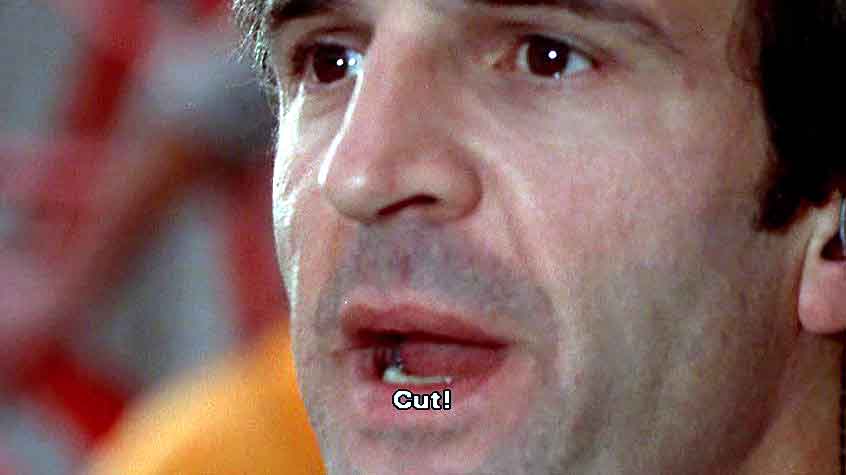Movies about movies usually don’t quite get things right. The film business comes out looking more romantic and glamorous (or more corrupt and decadent) than it really is, and none of the human feeling of a movie set is communicated. That is not the case with Francois Truffaut’s funny and touching film, “Day for Night,” which is not only the best movie ever made about the movies but is also a great entertainment.
A movie company, especially if it’s away from home on a location somewhere, is a family that’s been thrown into close and sometimes desperate contact; strangers become friends and even intimates in a few weeks, and in a few more weeks they’re scattered to the winds. The family is complicated by the insecurities and egos of the actors, and by the moviemaking process itself: We see the result, but we don’t see the hours and days spent on special effects, on stunts, on making it snow or making it rain or making an allegedly trained cat walk from A to B. “Day for Night” is about all of these aspects of moviemaking; about the technical problems, the boredom between takes (a movie set is one of the most boring places on earth most of the time), and about the romances and intrigues. It’s real; this is how a movie set really looks, feels, and smells. Truffaut’s story involves a movie company on location in Nice. They’re making a melodrama called “Meet Pamela,” of which we see enough to know it’s doomed at the box office. But good or bad, the movie must be made; Truffaut, who plays the director in his own film, says at one point: “When I begin a film, I want to make a great film. Halfway through, I just hope to finish the film.”
His cast includes a beautiful American actress (Jacqueline Bisset); an aging matinee idol (Jean-Pierre Aumont), and his former mistress, also past her prime (Valentina Cortese); the young, lovestruck male lead (Jean-Pierre Leaud), and the entire crew of script girls, camera operators, stunt men, and a henpecked production manager. (And if you have ever wondered what the key grip does in a movie, here’s your chance to find out.) Truffaut sets half a dozen stories in motion, and follows them all so effortlessly it’s almost as if we’re gossiping with him about his colleagues. The movie set is a microcosm: there is a pregnancy and a death; a love affair ended, another begun, and a third almost but not quite destroyed; and new careers to be nourished and old careers to be preserved.
Truffaut was always a master of quiet comedy, and there are fine touches like the aging actress fortifying herself with booze and blaming her lack of memory on her makeup girl. Then there’s the young male lead’s ill-fated love for Jacqueline Bisset; she is happily married to a doctor, but unwisely extends her sympathy to the youth, who repays her by very nearly destroying her marriage as well as himself. And all the time there is the movie to be made: Truffaut gives us a hilarious session with the “trained” cat, and shows us without making a point of it how snow is produced on a set, how stunt drivers survive car crashes, and how third-floor balconies can exist without buildings below them.
What we see on the screen is nothing at all like what happens on the set a truth the movie’s title reflects. (“Day for night” is the technical term for “night” scenes shot in daylight with a special filter. The movie’s original French title, “La Nuit Americaine,” is the French term for the same process–acknowledging their debt to Hollywood.)
The movie is just plain fun. Movie buffs will enjoy it like “Singin’ in the Rain” (that perfect musical about the birth of talkies), but you don’t have to be a movie buff to like it. Truffaut knows and loves the movies so much he’s infectious; one of “Day for Night’s” best scenes is a dream in which the adult director remembers himself, as a little boy, slinking down a darkened street to steal a still from “Citizen Kane” from in front of a theater. We know who the little boy grew up to be, and that explains everything to us about how he feels now.



















